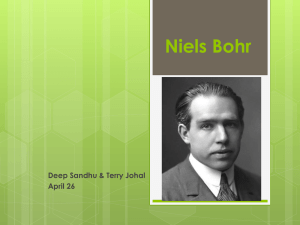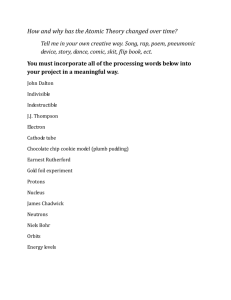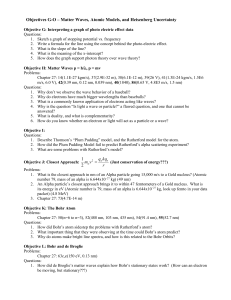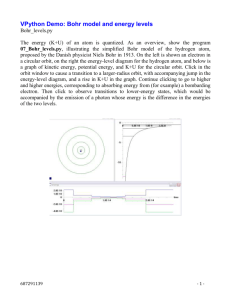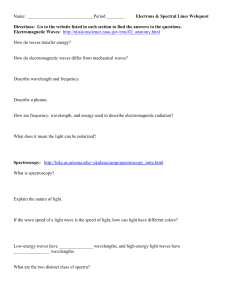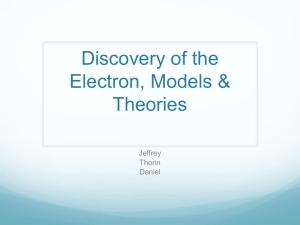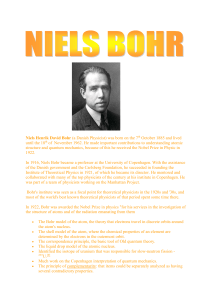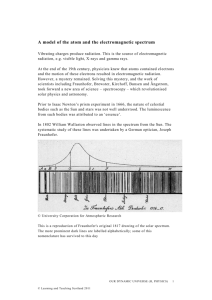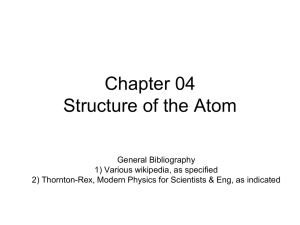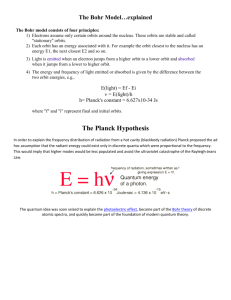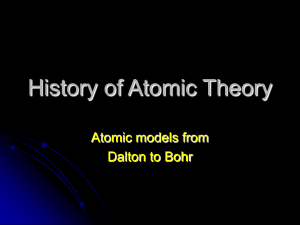AtomBohr
advertisement
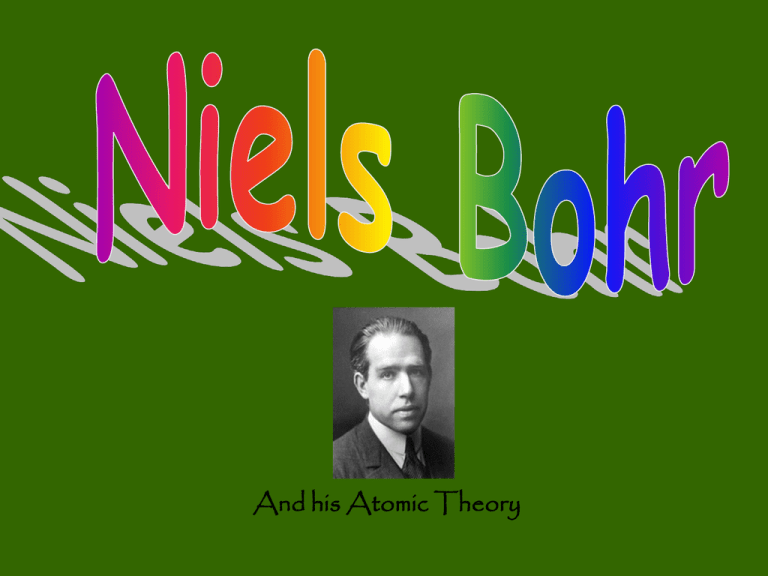
And his Atomic Theory Niels Bohr was born on October 7, 1885 and he died on November 18, 1962. He was born in Copenhagen, Denmark and he died in the same area. His parents were Christian Bohr and Ellen Adler, (Bohr). He had an older sister named Jenny, who was born in 1883, and a younger brother named Harald who was born in 1887. Harald and Niels were very close through out his childhood and he was often heard saying that Harald was his best friend all through his life. Niels entered the Grammelholms school in October of 1891, he attended this school for his complete secondary education. He did fairly well in school but could never lay claim to a brilliant mind, he usually came in forth or fifth in a class of twenty. In his last two years in school Niels specialized in mathematics and physics, he frightened his math teacher with his exceptional skills and would work ahead in the physics textbook often pointing out errors in the text. He was learned more about this subject than he did from his teachers. Bohr entered the University of Copenhagen in 1903. Physics was his major and he had minors in mathematics and chemistry. When he was in University he wouldn’t have been able to carry out any experiments in physics because the University didn’t have a laboratory, so he used his father’s physiology lab. And his first paper describes some of the experiments he did in the lab, he dedicated this paper to his brother, Harald. Due to this paper, Bohr, won the Gold Medal for 1906 from the Royal Danish Academy of Sciences, this was for his analysis of water jets being used to determine surface tension. He got his masters degree from the University of Copenhagen in 1909, and his doctorate in 1911for his thesis, Studies on the electron theory of metals. This thesis was dedicated to his father, who had died earlier in the year from a heart attack Bohr was engaged to Margrethe Norlund, who, many say, placed a key role in his successfulness, at the time of his father’s death. In 1911 in the month of September Bohr went to England to study with J J Thompson at Cambridge, he had hoped to spend a long period of time with Thompson, but, unfortunately, they didn’t get along. Lucky for him, he had met Rutherford earlier in that year and went to study with him instead, this was right after Rutherford had published his theory, which states that the bulk of the mass of an atom can be found in the nucleus. Bohr began developing his theory in June of 1912 He did his fundamental work on the hydrogen atom eventually he even did some work on some heavier atoms. Bohr returned to Copenhagen to continue working on his theory which he completed to his satisfaction in and around July of 1913. The University recommended his name for a chair in theoretical physics, he expected his position to be confirmed within a year. It wasn’t to be. He spent the next four years working with Rutherford and his group yet again, he enjoyed his time with the group immensely, participating in many break through activities. His completed theory of the atom gave us the clue as to where, exactly, electrons were found in an atom. He stated that electrons traveled on fixed energy levels. Sort of like a ladder, these electrons could change orbits but they would always be found in an orbit and there would always be a certain number of electrons in the orbital. Changing Energy Levels The fact that there were certain orbits and energies in an atom was part of Bohr’s theory. When these energies change levels there is a different color given off. Orbits were the key to Bohr’s theory People a long time ago, believed that the northern lights were a sign from God. Nobody would believe someone if he were to tell them that it could be explained with science, and if it was a woman trying to tell them this they would often be placed in an asylum or they would be placed in the care of one distant relative or another. Now we know the truth they can be explained by science and Niels Bohr is just the scientist to do it. To answer this, we start with the sun whose energy production is far from even and fluctuates on an 11 year cycle. Maximum production occurs at the same time as high sunspot activity, processes on the sun's surface throw particles far out in space. These particles are called the solar wind and cause the northern lights. The sun's surface temperature is approximately 6,000 0C, much cooler than the interior which is several million degrees. In the sun's atmosphere the temperature rises again to several million degrees. At such temperatures, collisions between gas particles can be so violent that atoms disintegrate into electrons and nuclei. What was once hydrogen becomes a gas of free electrons and protons called plasma. This plasma escapes from the sun's atmosphere through a hole in the sun's magnetic field. As they escape, they are thrown out by the rotation of the sun in an ever widening spiral - the so-called garden-hose effect. The name originates from the pattern of water droplets formed if we swing a garden hose around and around above out heads. -Bohr What causes the northern lights? Cont. The garden hose effect. The 11-year sunspot cycle compared to northern lights activity. Presentation done by Becca Prescott, Dane Huntley, Maria Davis and Samantha Stewert
